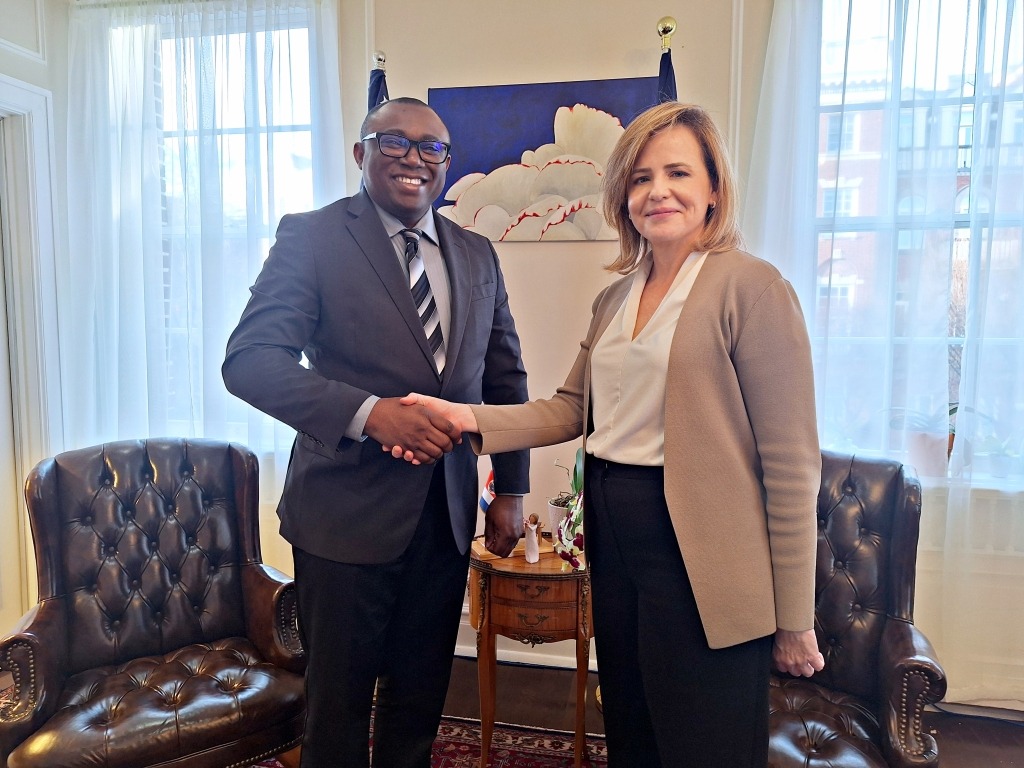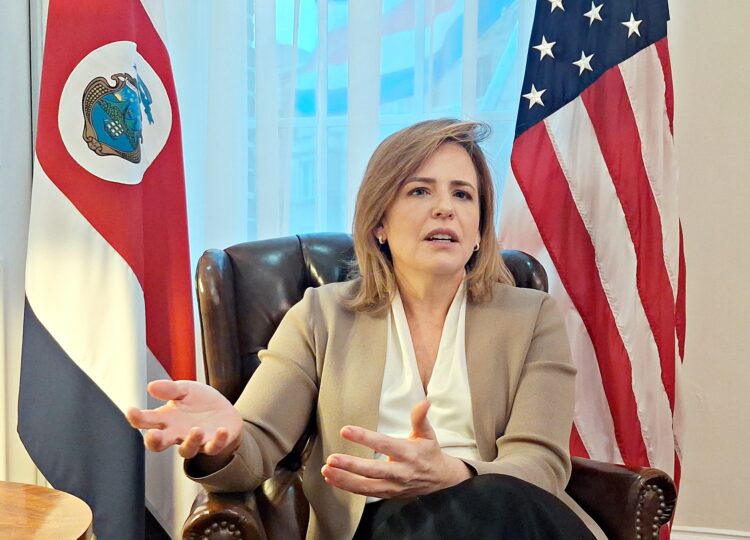In an exclusive interview with Diplomatic Watch, Costa Rica’s Ambassador offers rare insights into how a country without an army has become a global leader in peace, sustainability, and human rights. From reversing deforestation to generating 98% renewable energy, Costa Rica’s “Pura Vida” philosophy isn’t just a greeting—it’s a governance model that has propelled this small Central American nation to rank 12th in the World Happiness Report. Discover how human rights expertise shapes diplomatic engagement, why abolishing the military created new security paradigms, and the ambitious roadmap to carbon neutrality by 2050 that’s already decades in the making.
Your path from human rights work to becoming an Ambassador is unique. Can you tell us about a key moment that sparked your interest in international relations? How does your background in international development affect your diplomatic style?
First, it sends a strong message when a country—when a President—chooses an Ambassador to the United States with a background as a specialist in human rights. That alone says a lot about Costa Rica and the Costa Rican people. We are a country known for peace, democracy, environmental leadership, and maintaining good relations with all countries, even those where relations can be complicated. Most of all, we are a country without an army. So, when we talk about the world—especially in times as chaotic as today—and you look at Costa Rica, that’s already something remarkable.
That’s the environment I grew up in. I grew up in a country, a community, and a school system—both in elementary and high school—where peace was considered one of the most important values. We were taught to respect others, even if they looked or thought differently. We also learned to care for the environment. That’s how Costa Rican children are raised, including myself and generations before and after me.
This background has had a huge impact on my career path. I’m very proud of the decision I made—although I can’t pinpoint exactly when—that to create a better world, we all have a responsibility to act. In my case, I chose to focus on human rights, working with the most vulnerable populations. I did this in a technical capacity at the World Bank, focusing on the prevention of violent conflict in Africa, Asia, and Latin America. I also served as the head of Costa Rica’s National Human Rights Institution, working across the Latin American region on issues like immigration, women and children’s rights, and social cohesion.
These experiences inform the work I do as an Ambassador. My President appointed me to this role with full knowledge of my background, which in itself sends a powerful message: Costa Rica values human rights at the highest levels of diplomacy.
As for how this affects my everyday work—it affects it very positively. I’d describe my role on two levels. First, at the bilateral level, my primary responsibility is engaging with the U.S. government. We collaborate on trade and commerce, but in everything I negotiate, there’s always an element of peace, democracy, and improving life not just for Costa Ricans but for people everywhere.
Second, at the collegial level, I interact with representatives from more than 150 countries. Costa Rica plays an interesting role as a kind of bridge. We are one of the few countries that get along with everyone. We aren’t in conflict with any country. So, I have strong ties with the Latin American and Caribbean region, which we are part of, but Costa Rica also maintains excellent relations with African nations, Europe, Eastern Europe, and Central Asia. In Washington, Costa Rica is respected not just for its peaceful bilateral relations but also among the diplomatic community for being a consistent advocate for peace and human rights.
An Exclusive interview with H.E. Catalina Crespo-Sancho, Costa Rica’s Ambassador to the United States. Read full interview here: https://t.co/mF4ShZtLsQ @CRcancilleria @CR_embassy @Wecaa_official @KimberlyBassett @JanDuPlain @gotebs @Popeson @PatrickRealiza @HealthyLights… pic.twitter.com/GZ2jylMNXE
— DiplomaticWatch (@Diplo_Watch) March 18, 2025
Costa Rica is known for its strong environmental leadership. How does this “green” reputation affect your work with the United States, especially when dealing with issues like climate change?
Interestingly, it doesn’t change our relationship with the U.S. one way or another. Costa Rica made its choice long ago about how we would develop our economy, our education system, and our social systems. Back in the 1970s, we decided to focus on renewable energy. While other countries in Central America pursued different sources of electricity, we chose to go green by investing in dams and renewable energy. Today, between 95 and 99 percent of our energy comes from renewable sources, depending on the year.
Regardless of how this affects our bilateral relations, this is the path Costa Rica has chosen. We are also the only country in the world that has reversed deforestation at a time when so many are losing forest cover. We pioneered payments for ecosystem services, where farmers receive compensation for preserving forests on their land instead of cutting them down. These decisions have helped farmers and protected the environment.
How does this influence our relationship with the U.S.? When I speak to members of Congress or the Senate about how Costa Rica gets more than 95 percent of its energy from renewable sources, they are often surprised and impressed. It demonstrates that it’s possible to live by your principles. Costa Rica is an example of a country that truly walks the talk—not just in environmental stewardship, but also in peace, democracy, education, and healthcare.
We say the environment matters, and we pass laws to protect it. We say peace matters, so we’ve abolished our army and prioritized peace education. We say healthcare matters, and we offer universal healthcare. Despite challenges, we maintain one of the world’s top health systems. We have a literacy rate between 96 and 98 percent, far higher than many countries that have not invested as we have. For Costa Rica, education, health, the environment, peace, and democracy are the foundations of our society.
Costa Rica abolished its military in 1949, shaping a unique approach to security and foreign relations. How has this influenced your discussions with the United States, particularly around security cooperation? And how does this model of peace and neutrality relate to Costa Rica’s consistent ranking as one of the happiest countries in the world?
I think the Happiness Report doesn’t really look into whether a country has an army or not. However, I would have to say that Costa Rica is now at number 12 for 2024. We were number one, then number two, then number three. We have been going up and down, but it is still the happiest country in Latin America and the Caribbean, which is already a big plus.
There are many things that contribute to that happiness, based on what people explain about the study they conduct. Of course, it’s related to the peacefulness that people live in the country. Because we are so used to it, we can’t really compare it to anything else. When I am here—and I notice people who travel—I talk to a lot of people here in the United States because this is where I’m stationed right now. They go to Costa Rica for tourism or work, and they come back in love with the country. Of course, I’m from there, so I’m used to this being normal. It should be normal that people don’t have an army. It should be normal that democracy is important, that peace is important, that we get along, that we have 20 percent of our population made up of migrants, and that we coexist with them peacefully. You think that is the norm, but it isn’t in many other countries.
So when I hear people who visit—even for work or tourism—say, “We are in love with your country,” I think, “Of course, I love my country too!” Then they tell you things that, as a Costa Rican, you take for granted. They say people are kind, people are nice, and they’re always happy. We have a saying that we use for everything: “Pura Vida,” which means pure life. We use it to say hi—Pura Vida. To say bye—Pura Vida. To ask, “How are you doing?”—Pura Vida. It doesn’t matter your social class, your standing, or your profession. We all use Pura Vida.
But again, as a Costa Rican, I am used to it. I am used to saying it. I am used to it meaning “everything is fine.” It’s when foreigners come and tell us how special Costa Rica is that we realize it’s not the norm everywhere else in the world.
I do wish the world would be a more peaceful place. I do wish there was no need for armies, fighting, or conflict. As a Costa Rican, I wish people respected each other the way most Costa Ricans do. I also wish human rights, kindness, and happiness were the norm—although I know they are not.
When I talk to people from other countries, including military personnel, they often ask, “How do you live without a military?” That’s the first question I get. “How do you defend yourselves? Who defends you? Maybe someone else defends you?” And we answer: We don’t need to defend ourselves because we don’t have an army. We hope things don’t escalate. We are good at negotiating diplomatically. We have a very strong diplomatic corps. And, again, it’s about respecting the person in front of you, no matter their nationality, race, or religion. That, by itself, makes any negotiation much better.
As a Costa Rican, I wish more people could live the way Costa Ricans live.
Costa Rica has helped broker peace in the region and is seen as a stable democracy. How does this history of peacemaking shape your foreign policy and global image today?
Costa Rica is well known internationally for being a country of peace, a country committed to the environment, and a country—again—without an army. For some people, that’s surprising in a negative way. They ask, “How do you live without an army? How do you defend yourselves? Somebody else has to defend you?” But others see it positively and ask, “Is that even possible?”
Costa Rica has had conflicts—it’s not that we haven’t, especially with other countries. However, until today, we’ve been able to de-escalate them. We go through the diplomatic route. We go through all the channels related to the rule of law at the international level, and we have been successful at that until now. I hope we continue to be successful in the future.
One experience I’ve had is giving talks about peace, conflict prevention, and democracy all over the world. I remember once I gave a talk to military personnel from different countries. The first question they asked was, “Why is Costa Rica here? Why are you speaking to military personnel?” My answer was, “Wait until my speech.” So, I talked to them about how you look at data, how you work with social cohesion, how you prevent violent conflict—which is important—and how you strengthen institutions. I explained how we do all of that.
I remember after the talk, one of the officers came up and said, “Now we know why they invited Costa Rica here. You’ve given us ideas we’ve never thought of before. We never thought that was even possible.” And I said, “Well, I told you!” Hopefully, Costa Rica is an example of how peace can be lived every single day. It is possible. Difficult, yes. Can every country do it? Not in the current circumstances. But it can be a work in progress.
I think the people who want peace the most are sometimes even the people in the military. They know the price they have to pay, and they want peace.
Hopefully, Costa Rica is seen as a beacon of light around the world, showing that peace is possible. Being responsible for your environment is possible. Being happy is possible. Does that mean we don’t have challenges? No, I’m not saying that. Costa Rica does have quite a few challenges. But every day, we work knowing that democracy and peace cannot be taken for granted. We might have them today, but Costa Rica works every day to make sure we have them tomorrow, in ten years, and a hundred years.
“Pura Vida” is a big part of Costa Rican culture. How do you bring this positive outlook into your diplomatic work and interactions with other countries?
“Pura Vida” means pure life. It’s something we use every single day. I say it with my mom, my sister, my kids, and even my husband who is German. I use it with our friends and at work. I’ve seen my president use the phrase with people he meets regularly. It’s very basic for us and reflects how we relate to everyone else and to each other.
“Pure life.” How’s everything? Pure life. How are you doing? Pure life. We even have T-shirts that say “Pura Vida.” I think that positive outlook is one reason why we rank so highly in the World Happiness Report. We were number 12 this year, though we’ve been higher in the past. It’s not that we don’t have problems or challenges—we do. But we work every day to avoid creating more problems and to find solutions that make a better future, not just for individuals but for society as a whole.
For example, 20 percent of our population are migrants. That’s high compared to other countries. We’re the fourth country worldwide for refugee applicants—after the U.S., Germany, and France. That’s three large, developed countries, and then there’s Costa Rica, a small, middle-income nation. Yet, we’ve been successful in integrating migrants. They come, they contribute, they become part of Costa Rican society. People don’t see them as a threat. If they follow the legal process and help make our country better, they’re welcome.
I’ll give you an even simpler example. Our national animal is the sloth. Everyone knows sloths as peaceful animals. They don’t harm anyone, no one wants to harm them. I think that reflects Costa Rica’s philosophy—go slow, respect everyone, respect yourself. But even if it takes time, we keep moving toward where we need to go. Maybe the sloth isn’t just our national animal—it represents the insight and approach we live by.
Costa Rica plans to have zero emissions by 2050. Which specific programs or policies do you think have worked best in making Costa Rica a sustainability leader? What can other countries learn from what you’ve done?
That’s a great question. By 2050, we hope to be the first country in the world to achieve carbon neutrality. But I have to say, we already have a head start. In the 1970s, we began investing in renewable energy. Today, depending on the year, about 95 to 98 percent of our energy comes from renewable sources. That’s because of work that started 30, 40, even 50 years ago.
On top of that, we have strong policies, laws, and regulations in place. Some are simple but effective. For example, Costa Rica decided to ban plastic straws a few years ago. Why? Because we saw the damage they were causing—polluting oceans and rivers, harming turtles and fish. We take environmental protection seriously. We believe that if we take care of the environment, people will benefit in every possible way. It’s about protecting oceans, rivers, land—all of it.
So, these strict laws and regulations give us a chance to reach our 2050 goal. We’ll see how it goes, but we’re committed to getting there.
What are your main goals as Ambassador? What lasting difference do you want to make in the U.S.–Costa Rica relationship, particularly regarding environmental protection and sustainable development?
At this moment in time, I believe the most important contribution Costa Rica—and our Embassy here in the United States—can offer is to demonstrate that peace is possible. That you can engage in diplomacy, build respectful relationships with other nations and communities, and still protect human rights and the environment.
The world feels complex right now. We’re seeing rising conflicts both within and between nations. Costa Rica can serve as a beacon of hope, offering an example of how a country can maintain peace, democracy, and a high quality of life, while actively engaging in trade and global cooperation. Of course, we face challenges like any nation, but we approach them with the belief that peace and democracy aren’t things you can take for granted. You have to work on them every single day.
We’ve gone from being a largely agricultural, low-income country to a middle-income country with a thriving economy. Our number one export today is medical devices. And we are developing other sectors like semiconductors. This shift has happened because of long-term investment in education, health, and social services, and by strengthening institutions that serve the people. If Costa Rica can be an example for other countries, I hope it’s to show that when you prioritize education, peace, health, and strong democratic institutions, you create a better life for your people—and a better world.

What advice would you give to young people aspiring to follow a similar path in diplomacy?
First, become technically skilled in something—anything you’re passionate about. Whether it’s international law, economics, the environment, or something else, you need to have a foundation of expertise. But don’t stop there. Stay curious and informed about other areas, even if they aren’t your specialty. A good diplomat is well-rounded.
Second, follow what you love. You’ll hear people say it’s too hard or not practical, but if your heart is in it—if it’s what gets you up in the morning—then stick with it. There will be tough days, disappointments, and frustrations, but persistence matters. Be diligent. Study hard. Keep working. Nothing comes for free, but if you put in the effort, you can make a difference.









